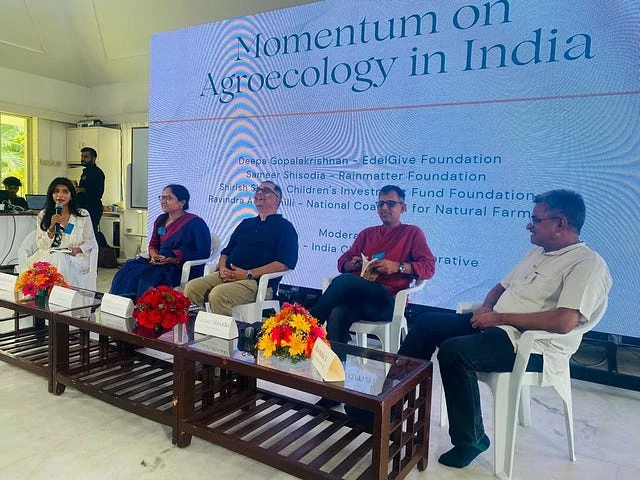In this short interview, Gro Solar Energy Pvt. Ltd. takes us through their agrivoltaics pilot in Dhule, Maharashtra, and shares learnings for climate funders from their farming-based model that optimises land and water resources.
What is your vision for this pilot?
This is a 10MW DC (7MW AC) agri-PV (agri-photovoltaics) project taken up under the Government of Maharashtra's MSKVY 1.0. for daytime power supply to farmers for irrigation. Our vision is to make an environmentally, socially and cost effective-commercially sustainable agri-PV plant for the coming generations. The solar power is currently purchased by MSEDCL @ INR 3.10 (USD).

What is unique about your model?
Commissioned on 25 June 2021, this plant is likely a one-of-its-kind project to be taken up by a family-promoted MSME in India, on this scale. It is set up on semi arable land in Degaon, Taluka-Sindakhede (Dhule, Maharashtra), a drought prone area, with the objective to optimally utilise the land, water, and other available limited resources to develop a farming-based agri-PV plant. This will help the farmers and local communities with daytime power supply for irrigation and other purposes.
Farming is done by family members at arm's length arrangements, and solar power generation is managed by a PLC owned by family and friends, with mutual understanding to ensure win-win. This family- and friends-owned enterprise has very strong environmental and social objectives as this is the native place of the promoters and the farmers who transferred ownership of this land to the PLC.
Two key learnings from this pilot
- Focus on high-value low-volume agriculture, which can have longer shelf life after processing.
- Do integrated farming with agri-PV and, for this, have at least single axis trackers with a minimum height of 8 feet.
Key messages for funders looking at this space
- Select project sites within driving distance from metro cities and avoid water starved regions.
- Investors with a long-term view and those who are inclined to pay their environmental and societal debts can help this space scale up or else it will have to sustain only with subsidies, grants and/or feed in tariffs.
Stay updated about Gro Solar’s work.
Want to learn more about funding opportunities for agrivoltaics? Write to us at solutions@indiaclimatecollaborative.org.

Subscribe to our Newsletter
Join ICC's monthly newsletter and read more about uplifting climate narratives, innovative solutions, and other updates.




